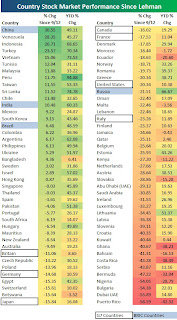We opined that the collapse in world economic and market activities in the last quarter of 2008, which was principally an outgrowth of the seizure in the US banking system, engendered a psychological "shock and awe" trauma for the world.
Similar to infamous 9/11 tragedy, such anxiety disorders overwhelmed the public's psychological defenses, wherein the subsequent reaction have been to dramatically undertake massive adjustments in the ecosystem as fear governed. [See discussed in "What Posttraumatic Stress Disorder (PTSD) Have To Do With Today’s Financial Crisis."]
This is what I think the world is presently enduring.
And we seem to have found clues to support our thesis. Mr. Andrew Foster, Chief Investing Officer of Matthews Asia/Matthews International capital noted of a "Before Lehman and After Lehman" stigma, in his recent sojourn in 4 Asian countries.
This is his observation (all bold highlights mine)...
``I would venture to guess that many of the managers I met on my trip would have struggled to recognize the name “Lehman” prior to last September, and very few could claim to have suffered directly as result of Lehman’s collapse (e.g. exposure as a creditor or an investor). Yet what was interesting about the phrase was the universal way that these managers were using “Lehman” as a means to explain (or excuse) the frustrating downturn in the performance of their companies. For me, this highlighted the external nature of the current crisis: these managers were not coping with changing technologies, heightening competition or demand destruction; rather, a strange and unseen external shock had suddenly crippled the outlook for their businesses. It was as if all the managers were struggling simultaneously to understand the nature of this invisible shock, and had picked up the same newspaper on the same day, read the same headline, and said to themselves, “Oh, that’s what it is.”
``One illustration of this comes to mind: a newspaper company in Delhi that I visited publishes two editions, one in English and the other in Hindi. The former was seeing ad revenues decline by roughly a 20% annual clip, presumably because gloomy headlines in the English-language press were reverberating around the world, robbing confidence, and with it, economic prospects. Meanwhile, the Hindi version was seeing growth of nearly 30% in its ad rates. This growth may not be sustained; the global shock may come to roost in the Hindi segment as well. I asked management about this anomaly. They had asked the same question of some of their customers, to which the somewhat ironic reply was, “What recession?” Apparently the dour headlines had yet to penetrate those parts of India."...
Here is the clincher...
Again from Mr. Foster...
``But interestingly, most are simply frozen in stasis, paralyzed by a sort of uncertainty about what the future might hold. People everywhere are struggling to cope with what the headlines mean for them. While the shock Lehman precipitated was severe, the uncertainty—even fear—it generated has been more widely felt."
Like us, Mr. Foster believes that time will heal such mental stresses...
Again from Mr. Foster, ``Yet it is my experience that with time and stability fear tends to pass. And here is a possible silver lining: when the present fear does pass, many of these Asian companies might find that the fundamentals they once enjoyed (save perhaps easy access to financing) have not deteriorated to the same extent as they have elsewhere in the world, especially here in the United States. "B.L. / A.L." will undoubtedly be scorched in investors' memories permanently. Yet with a bit of luck, it will become more of a catch phrase rather than destiny itself."
So I'd be wary of any analysis, which omits the context of human psychology to deal with anxiety disorders such as the PTSD, and utilize the "After Lehman syndrome" to project into the future.
